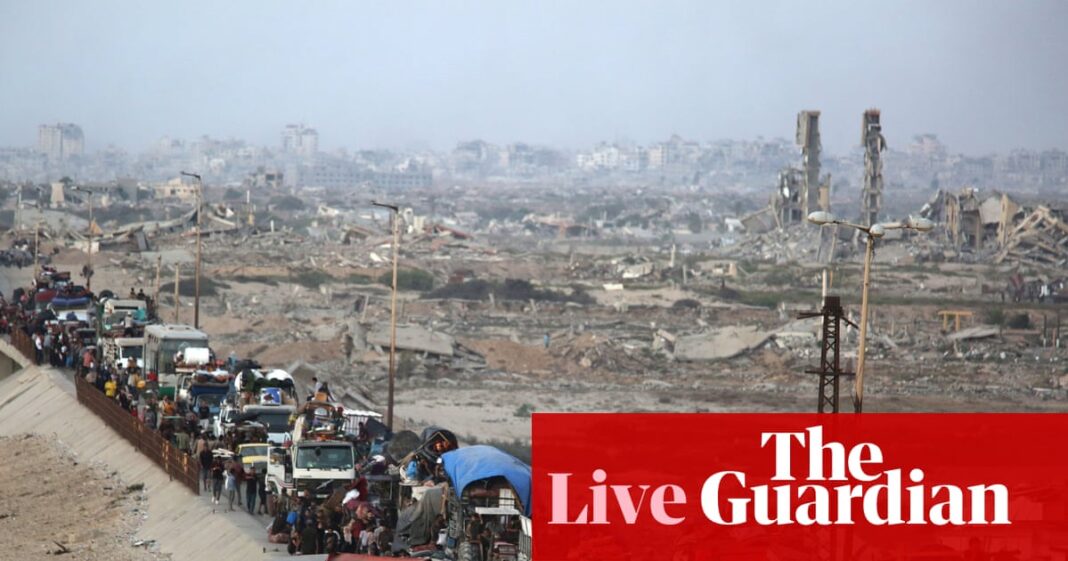Israel army says will use ‘unprecedented force’ in Gaza City and urges residents to leave
The Israeli military warned on Friday it will operate with “unprecedented force” in Gaza City, urging residents to flee southwards while announcing the closure of a temporary evacuation route opened 48 hours earlier.
In a post on X addressing residents of Gaza City, the military’s Arabic-language spokesperson, Avichay Adraee, said:
From this moment, Salah al-Din road is closed for southbound travel. The Israeli Defence Forces will continue to operate with unprecedented force against Hamas and other terrorist organisations.
He added the only possible route south was via Al-Rashid street and urged residents to “take this opportunity and join the hundreds of thousands of city residents who have moved south to the humanitarian area”.
Strikes by Israeli artillery, tanks and warplanes hit Gaza City again on Thursday as a UN official said “new waves of mass displacement” were under way, after about 60,000 fled the new assault in 72 hours earlier this week.
Israeli military officials said Gaza City was a “Hamas stronghold” and that as many as 450,000 civilians had left. The estimate was based on multiple sources, including drone surveillance, an official told the Guardian.
Swathes of Gaza City, once a busy commercial and cultural hub, have been reduced to uninhabitable ruins. Until weeks ago, more than a million people were living there, many already displaced numerous times.
More on this in a moment, but first here are a number of other key developments:
-
More than a quarter of a million people have been displaced from Gaza City in the last month, according to figures from the UN, with tens of thousands more forced to flee makeshift homes and shelters daily in the face of a new Israeli offensive.
-
UK prime minister Keir Starmer has insisted the timing of the UK announcement that it could recognise the state of Palestine as early as Friday has nothing to do with Donald Trump’s visit, even though the US president said at a press conference that he disagreed with Britain’s decision, without elaborating.
-
More than 140 world leaders will arrive in New York next week for the annual United Nations general assembly summit, which will be dominated this year by the future of the Palestinians and Gaza. One world leader who will miss the gathering is Mahmud Abbas, the Palestinian president who Washington denied US visas to attend, along with his officials.
-
The US once again has vetoed a UN security council resolution that had demanded an immediate and permanent ceasefire in Gaza and the release of hostages. It also expressed alarm about a recent famine report and Israel’s expanding offensive in Gaza City. The 14 other members of the United Nations’ most powerful body voted in favor of the resolution Thursday
Key events
Israel’s military said it had expanded operations in Gaza City on Friday and bombarded Hamas infrastructure, while displaced Palestinians traumatised by the advance said they had no means to flee.
“The situation is really bad. All night long, the tank was firing shells,” said Palestinian Toufic Abu Mouawad, who left a camp for the displaced with nowhere else to go.
“I want to flee with the boys, the girls, the children. This is the situation that we are living in. It is a very tragic situation. We call on all the Arab countries and the people who have a good conscience to stand with us.”
Israeli forces control Gaza City’s eastern suburbs and in recent days have been pounding the Sheikh Radwan and Tel Al-Hawa areas, from where they would be positioned to advance on central and western areas, where most of the population is sheltering.
The Gaza health authorities said 33 Palestinians had been killed in the last 24 hours.
Palestinians struggle to get donated food at a community kitchen in Khan Younis, southern Gaza Strip, earlier today.
A €30m ($35.24m) one-time payment to the Palestinian Authority that Germany was hoping to announce next week to coincide with European allies’ formal recognition of a Palestinian state has been held up by sceptical legislators, Reuters reports citing the Bild newspaper.
The payment is designed to ensure that salaries of teachers and healthcare workers can be paid at a time when Israel, which collects customs and import taxes on behalf of the authority that exercises limited self-rule in parts of the Israeli-occupied West Bank, is withholding funds. The Palestinian Authority says Israel has withheld around $3bn.
The German emergency payment was agreed by development minister Reem Alabali Radovan during a Middle East trip earlier this month and is supported by both conservative chancellor Friedrich Merz and his Social Democrat deputy, Lars Klingbeil.
But Alexander Hoffmann, a conservative legislator, told Bild that members of his powerful parliamentary budget committee had concerns about the payment, which they must approve.
“We need more clarity,” he told Bild. “Humanitarian aid is important but it has to be clear what projects are being funded … Projects that endanger Israel’s security have to be clearly excluded.”
Officials said the money was likely still to be paid once legislators’ concerns had been addressed.
The German government says the funds are needed for salaries because of the dire economic situation in the Palestinian Authority area since the start of the Gaza war.
“The authority is in an acute financial emergency,” a development ministry spokesperson told a regular government news conference on Friday, adding that the start of the school year had already been delayed for this reason.
“We must make sure the money doesn’t end up in the wrong hands,” said Jürgen Hardt, a senior conservative and foreign affairs committee member. “But once that’s done, there are very good reasons for this aid.”
Merz said during a visit to Madrid on Thursday that Israel’s actions in Gaza were not proportionate to its stated goals and indicated German openness to backing European Union sanctions against Israel (see 11.59am BST).
The Israeli military on Friday said about 480,000 Palestinians have fled southwards from Gaza City since late August, as it presses its ground offensive in an attempt to seize the territory’s largest urban centre.
When asked by Agence France-Presse (AFP) for a figure since the end of August, the military said:
The estimate is approximately 480,000.
The United Nations estimated at the end of August that about one million people were living in Gaza City and its surroundings.
Israeli fire killed at least 22 people across Gaza on Friday, including 11 in Gaza City, according to a tally of figures given by Gaza hospitals contacted by Agence France-Presse (AFP).
In a statement, the Israeli military said its troops continued to “expand their activity” in Gaza City, adding it had “dismantled more than 20 military infrastructure sites” over the past day.
Japan does not plan to recognise a Palestinian state at UN meetings this month, foreign minister Takeshi Iwaya said on Friday.
But he also said that for Tokyo, which supports a two-state solution between Israel and the Palestinians, it is not a matter of whether to recognise a Palestinian state, but when to recognise it.
“I’m aware voices calling for the recognition as a state are getting louder in the international community as well as in Japan,” Iwaya told a press conference.
“But the government has a responsibility to look hard into what will really lead to a two-state solution and to make diplomatic efforts towards that direction.”
A handful of US allies are preparing to recognize a Palestinian state as world leaders meet at the UN General Assembly in New York next week in the hope of putting pressure on Israel to allow more aid into Gaza and seek long-term peace.
Pakistan’s defence minister says his nation’s nuclear programme “will be made available” to Saudi Arabia if needed under the countries’ new defence pact, marking the first specific acknowledgment that Islamabad had put the kingdom under its nuclear umbrella.
Defence minister Khawaja Mohammad Asif’s comments underline the importance of the pact struck this week between Pakistan and Saudi Arabia, which have had military ties for decades, AP reports.
The move is seen by analysts as a signal to Israel, long believed to be the Middle East’s only nuclear-armed nation.
It comes after Israel’s attack targeting Hamas leaders in Qatar last week killed six people and sparked new concerns among Gulf Arab nations about their safety as the Israel-Hamas war devastated the Gaza Strip and set the region on edge.
Palestinian authorities have arrested a key suspect in an antisemitic attack on a Jewish restaurant in Paris which left six people dead in Paris in 1982, French prosecutors said on Friday, reports Agence France-Presse (AFP).
The office of the France anti-terror prosecutor said it was informed by Interpol of the arrest of 70-year-old Hicham Harb, welcoming “this major procedural breakthrough” and thanking the Palestinian authorities for their cooperation.
President Emmanuel Macron hailed the announcement, saying the suspect had been arrested in the occupied West Bank. He said on X:
I welcome the excellent cooperation with the Palestinian Authority. We are working together to ensure his swift extradition.
This is another step forward for justice and truth. My thoughts are with all the families who have endured the pain of waiting for so long.
Harb is suspected of leading the attackers in the gun assault on the Jo Goldenberg restaurant in Paris’s Marais district, a historically Jewish quarter.
Harb, who has been the subject of an international arrest warrant for 10 years, is one of six men referred to the special assize court in Paris in July over the attack, reports AFP.
The attack on 9 August 1982, which left six people dead and 22 injured, was blamed on the Abu Nidal Organisation, a splinter group of the militant Palestinian Fatah group.
Agence France-Presse (AFP) footage from the Al-Rashid coastal road on Thursday showed long lines of Palestinians heading south on foot or in vehicles piled high with meagre belongings.
In western Gaza City on Friday, displaced Palestinian Sami Baroud described “relentless and intense shelling”. “Our life has become nothing but explosions and danger,” the 35-year-old told AFP by telephone. Baroud added:
We have lost everything – our lives, our future, our sense of safety. How can I evacuate when I can’t even afford transportation?
Umm Mohammed Al-Hattab, 49, also told AFP that her family had nowhere to go and couldn’t afford the cost of moving. She said:
My seven children and I are still living in tents in western Gaza City after [Israel] bombed our home.
The bombing hasn’t stopped, and at any moment, we expect a missile to fall on us. My children are terrified, and I don’t know what to do.
Recognising Palestinian state ‘key’ for peace, says Luxembourg PM
Recognising a Palestinian state will help keep alive the peace process in the Middle East, Luxembourg’s prime minister told Agence France-Presse (AFP) as his country prepares to take the step next week.
Of the United Nations’ 193 member states, 147 already recognise a Palestinian state, but none of the Group of Seven major economies did so until now.
Luxembourg is among a number of nations including Australia, Belgium, Canada, France and the United Kingdom that plan to join their ranks at a UN summit in New York on 22 September.
“I would like the Israeli and Palestinian peoples to keep hope alive that one day they will be able to live in peace,” prime minister Luc Frieden said in an interview with AFP.
The recognition will be “a key moment in this process … an important step in a long march towards peace and stability in the region”, said the 62-year-old centre-right leader, who will be in New York to represent his country.
Last week, the UN general assembly overwhelmingly adopted a text supporting a future Palestinian state, albeit without Hamas.
“We will see on Monday what the Arab countries have to say. The fact that they condemn Hamas is new. Hamas must go and Arab countries must help us to achieve this,” Frieden said.
Israeli prime minister Benjamin Netanyahu has said “there will be no Palestinian state” and his government maintains that recognising Palestinian statehood would destabilise the Middle East and reward Hamas.
“Everything we do is not against the Israeli people but is intended to stop the atrocities we are seeing in Gaza,” said Frieden.
Luxembourg, one of the European Union’s founding members, supports proposed EU sanctions against Israel including curbing trade ties, he added.
“If they don’t listen to us, unfortunately we will have to move towards sanctions,” he said of Netanyahu’s government.
More than 250,000 displaced from Gaza City in past month, UN figures show

Jason Burke
More than a quarter of a million people have been displaced from Gaza City in the last month, according to figures from the UN, with tens of thousands more forced to flee makeshift homes and shelters daily in the face of a new Israeli offensive.
Strikes by Israeli artillery, tanks and warplanes hit Gaza City again on Thursday as a UN official said “new waves of mass displacement” were under way, after about 60,000 fled the new assault in 72 hours earlier this week.
Israeli military officials say the total number following Israeli orders to evacuate Gaza City is much higher.
An unbroken column of traffic heavily laden with household utensils, blankets, mattresses, gas cylinders and often entire families packed Gaza’s narrow coastal road on Thursday as a steady stream of Palestinians headed south towards areas designated by Israel.
Prices for transport have soared, forcing some to walk, laden with belongings and young children. “We are heading to go sleep on the streets towards the beach, like this, barefoot … We don’t know where to go,” said Yasser Saleh, speaking as he stood on a rickety trailer being pulled by a car.
Israeli military officials said Gaza City was a “Hamas stronghold” and that as many as 450,000 civilians had left. The estimate was based on multiple sources, including drone surveillance, an official told the Guardian.
Israeli forces now control Gaza City’s eastern suburbs and in recent days have moved into the Sheikh Radwan and Tel al-Hawa areas, from where they would be positioned to advance on the central and western districts where most of the remaining population is sheltering.
Swathes of Gaza City, once a busy commercial and cultural hub, have been reduced to uninhabitable ruins. Until weeks ago, more than a million people were living there, many already displaced numerous times.
German chancellor Friedrich Merz and Spanish prime minister Pedro Sánchez on Thursday acknowledged differences over the Gaza conflict after talks in Madrid, reports Agence France-Presse (AFP).
The two governments hold “divergent views” on the conflict and draw “different conclusions” regarding the situation, Merz said at a news conference with Sanchez.
The conservative German chancellor said that Germany stood “firmly” with Israel but described its military response in Gaza as “disproportionate”.
“Criticism of the Israeli government must be possible, but we must never allow it to be used to incite hatred against Jews,” he said, adding that he and Sánchez agreed on this point. But unlike Sánchez, Merz avoided calling the Israeli offensive in Gaza a “genocide” and made clear that Germany currently had no plans to recognise a Palestinian state, as Spain has done. “This is not on the agenda,” he said.
On proposed EU sanctions against Israel, Merz said Germany would finalise its position in the coming days and present it at an EU Council meeting on 1 October in Copenhagen.
Sánchez, meanwhile, voiced his full support for the European Commission’s proposed sanctions against Israel, warning that the country’s Gaza offensive would leave it “more isolated”.
Spain’s left-wing government has been one of Europe’s most outspoken critics of Israeli prime minister Benjamin Netanyahu and his military campaign in Gaza, launched in response to the Hamas attack on Israel in October 2023.
On Monday, Sánchez called for Israel to be barred from international sporting events over the war in Gaza, where the UN says Palestinians face starvation.
In the latest episode of the Guardian’s Today in Focus podcast, diplomatic editor Patrick Wintour and Arab Barghouthi, who advocates on behalf of his father, Marwan, a Palestinian political leader commonly referred to as ‘Palestine’s Mandela’, speak with host Nosheen Iqbal about what is motivating the UK’s imminent recognition of Palestine and why it matters.
You can listen to the podcast here:
UK preparing to recognise Palestinian state as early as Friday

Patrick Wintour
The UK is preparing to recognise the state of Palestine as early as Friday, after Israel failed to meet conditions that would have postponed the historic step, including a ceasefire in Gaza.
Keir Starmer insisted the timing of the UK announcement had nothing to do with Donald Trump’s visit, even though the US president said at a press conference that he disagreed with Britain’s decision, without elaborating.
Recognition will bring a wave of criticism from Israel, including claims that it is a reward for Hamas and terrorism, a charge the UK rejects by saying it envisages only a Palestinian state in which Hamas is disarmed, plays no part in the future government, and the leadership of the Palestinian Authority is subject to elections within a year.
Starmer emphasised there would be no place for Hamas, insisting the group were terrorists, and adding he agreed with Trump on the need for a roadmap.
The UK prime minister said recognition was “part of that overall package which hopefully takes us from the appalling situation we’re in now to the outcome of a safe and secure Israel, which we do not have, and a viable Palestinian state”.
The US, now in effect opposed to a two-state solution as unobtainable and undesirable, has rejected the UK move as unhelpful, but Trump has decided not to make the matter a point of division with Starmer given Washington sees it as a largely symbolic act that will not weaken Israel. The president has his own private frustrations with the Israeli prime minister Benjamin Netanyahu’s refusal to agree a ceasefire, as well as his bombing of Qatar last week.
The UK Foreign Office had long parried calls for recognition, saying the step should only be taken when it had maximum impact on the peace process. Following intense consultations with French diplomats, the UK shifted to backing recognition four days after Emmanuel Macron made his announcement on 25 July.
The delay gave Starmer time to talk privately to Trump on his visit to Scotland, and to set conditions that if fulfilled would delay UK recognition of Palestine. These included a resumption of humanitarian aid, a ceasefire, Israeli engagement in a sustained peace process, and no further Israeli land annexations in the West Bank. Israel was never likely to meet these preconditions, making UK recognition largely an issue of timing rather than content.
Israel army says will use ‘unprecedented force’ in Gaza City and urges residents to leave
The Israeli military warned on Friday it will operate with “unprecedented force” in Gaza City, urging residents to flee southwards while announcing the closure of a temporary evacuation route opened 48 hours earlier.
In a post on X addressing residents of Gaza City, the military’s Arabic-language spokesperson, Avichay Adraee, said:
From this moment, Salah al-Din road is closed for southbound travel. The Israeli Defence Forces will continue to operate with unprecedented force against Hamas and other terrorist organisations.
He added the only possible route south was via Al-Rashid street and urged residents to “take this opportunity and join the hundreds of thousands of city residents who have moved south to the humanitarian area”.
Strikes by Israeli artillery, tanks and warplanes hit Gaza City again on Thursday as a UN official said “new waves of mass displacement” were under way, after about 60,000 fled the new assault in 72 hours earlier this week.
Israeli military officials said Gaza City was a “Hamas stronghold” and that as many as 450,000 civilians had left. The estimate was based on multiple sources, including drone surveillance, an official told the Guardian.
Swathes of Gaza City, once a busy commercial and cultural hub, have been reduced to uninhabitable ruins. Until weeks ago, more than a million people were living there, many already displaced numerous times.
More on this in a moment, but first here are a number of other key developments:
-
More than a quarter of a million people have been displaced from Gaza City in the last month, according to figures from the UN, with tens of thousands more forced to flee makeshift homes and shelters daily in the face of a new Israeli offensive.
-
UK prime minister Keir Starmer has insisted the timing of the UK announcement that it could recognise the state of Palestine as early as Friday has nothing to do with Donald Trump’s visit, even though the US president said at a press conference that he disagreed with Britain’s decision, without elaborating.
-
More than 140 world leaders will arrive in New York next week for the annual United Nations general assembly summit, which will be dominated this year by the future of the Palestinians and Gaza. One world leader who will miss the gathering is Mahmud Abbas, the Palestinian president who Washington denied US visas to attend, along with his officials.
-
The US once again has vetoed a UN security council resolution that had demanded an immediate and permanent ceasefire in Gaza and the release of hostages. It also expressed alarm about a recent famine report and Israel’s expanding offensive in Gaza City. The 14 other members of the United Nations’ most powerful body voted in favor of the resolution Thursday
Emmanuel Macron says recognising Palestinian state will isolate Hamas
French president Emmanuel Macron saidon Thursday that recognising a Palestinian state would isolate the militant group Hamas and reiterated his condemnation of Israel’s devastating offensive in Gaza.
Speaking in English in an interview with Israeli television’s Channel 12, Macron said:
Recognising a Palestinian state is just deciding to say: ‘The legitimate perspective of Palestinian people and what they suffer today has nothing to do with Hamas.’
Recognition of a Palestinian state is the best way to isolate Hamas.
France and the UK are among several western countries that have pledged to formally recognise a Palestinian state this month at the United Nations general assembly.
Their plan aims to sideline Hamas and allow a two-state solution to the decades-long Arab-Israeli conflict – a proposal resisted by Israel’s prime minister Benjamin Netanyahu.
It has been reported that the UK is now preparing to recognise the state of Palestine as early as Friday, after Israel failed to meet conditions that would have postponed the historic step, including a ceasefire in Gaza.
With Israeli settlers pushing to occupy Palestinian territory in the West Bank, Macron said it was now the “last minute before proposing the two states would become totally impossible”.
According to Agence France-Presse (AFP), Israeli tanks and jets pounded Gaza City on Thursday in a major ground offensive.
“This type of operations in Gaza is totally counterproductive” and “a failure”, Macron said:
You are completely destroying the image and the credibility of Israel, not just in the region, but in public opinion everywhere.





